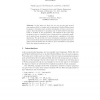4719 search results - page 27 / 944 » Newtonian program analysis |
159
Voted
ESORICS
2011
Springer
14 years 2 months ago
2011
Springer
Program authorship attribution—identifying a programmer based on stylistic characteristics of code—has practical implications for detecting software theft, digital forensics, a...
142
Voted
MEMOCODE
2010
IEEE
15 years 19 days ago
2010
IEEE
To overcome over-synchronization in synchronous programs, we recently introduced clock refinement to our synchronous programming language Quartz. This extension basically allows p...
143
Voted
CORR
2010
Springer
15 years 4 days ago
2010
Springer
The paradigm of Tabled Logic Programming (TLP) is now supported by a number of Prolog systems, including XSB, YAP Prolog, B-Prolog, Mercury, ALS, and Ciao. The reasons for this ar...
139
Voted
EMNLP
2009
15 years 16 days ago
2009
Polarity lexicons have been a valuable resource for sentiment analysis and opinion mining. There are a number of such lexical resources available, but it is often suboptimal to us...
132
Voted
ICLP
2003
Springer
15 years 8 months ago
2003
Springer
Abstract. In this paper we show how we can use size and groundness analyses lifted to regular and (polymorphic) Hindley/Milner typed programs to determine more accurate termination...

